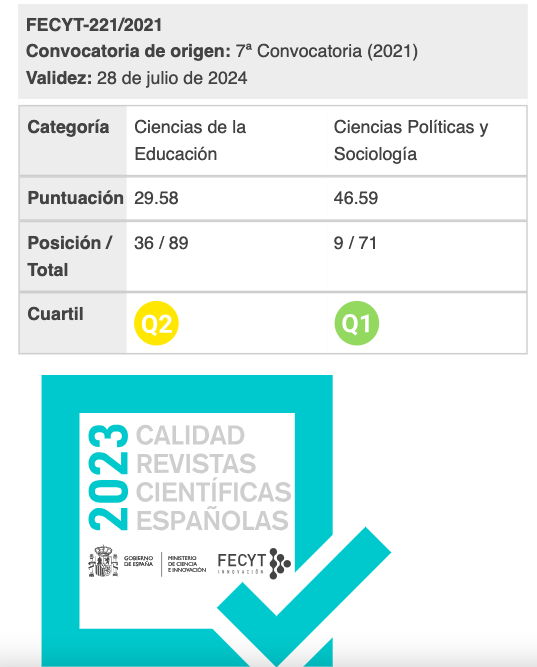Academic performance and other psychological, social and family factors in compulsory secondary education students in a multicultural context
Downloads
Abstract
This work aims to transfer research on academic achievement in compulsory secondary education (CSE) students (12-18 years) from personal factors to others of a psychosocial or sociological type, in a Spanish center with a high level of immigration, which welcome students from twenty eight nationalities whose percentage is about 60%. A second objective was to develop a brief measurement instrument to predict academic achievement, being the main dependent variable the number of suspended subjects in all three course evaluations, finding an optimal constellation of variables which may be more likely to achieve better academic achievement. 317 students of Secondary Education were part of this research in a public center of Zaragoza (Aragon-Spain) who were given an ad hoc Family Settings, Psychosocial and Contextual Questionnaire whose factorial analysis yielded three factors: Context Immigration, Family Settings and academic autobiographical history and study habits. Finally, we analyzed the differences found among students from different continents, trying to find sociocultural foundations and optimal conditions that can explain these differences. Further analysis allow us to glimpse a configuration of the most important variables that point to a hypothetical academic success in this educational field where there is great ethnic and cultural diversity.Downloads
References
Álvaro, M., Bueno, M. J., Calleja, J. A. Cerdán, J., Echevarría, M. J., García, C., Gaviria, J. L., Gómez, C., Jiménez, S., López, B., Martín-Javato, M., Mínguez, A. L., Sánchez, A., & Trillo, C. (1990). Hacia un modelo causal del rendimiento académico. Madrid: Centro de Publicaciones del Ministerio de Educación y Ciencia. CIDE.
Google Scholar CrossrefAndrés, A. (1996). Manual de Psicología Diferencial. Madrid: McGraw-Hill.
Google Scholar CrossrefArranz, E. (1989). Psicología de las relaciones fraternas. Barcelona: Herder.
Google Scholar CrossrefBroc, M. Á. (2000). Autoconcepto, autoestima y rendimiento académico en alumnos de 4º de ESO. Implicaciones psicopedagógicas en la orientación y tutoría. Revista de Investigación Educativa, 2000, (18), nº 1, 119-146.
Google Scholar CrossrefBroc, M. Á. (2006). Motivación y rendimiento académico en alumnos de Educación Secundaria Obligatoria y Bachillerato LOGSE. Revista de Educación, 340, Mayo-Agosto 2006, 379-414.
Google Scholar CrossrefBroc, M. Á. (2011). Voluntad para estudiar, regulación del esfuerzo, gestión eficaz del tiempo y rendimiento académico en alumnos universitarios. Revista de Investigación Educativa, 29 (1), 171-185.
Google Scholar CrossrefBroc, M. Á. (2012). Volición, Autorregulación y Aprendizaje. Implicaciones en el rendimiento académico y en la práctica educativa. Editorial Académica Española. LAP LAMBERT Academic Publishing GmbH & Co. KG. Saarbrücken. Alemania. info@eae-publishing.com
Google Scholar CrossrefBroc, M. Á. (2014). Harter´s Self Perception Profile for Children: An adaptation and validation for the Spanish Version. Psychological Reports, 115 (2), 444-466. DOI 10.2466/08.07.PR0.115c22z5
Google Scholar CrossrefBroc, M. Á. (2015). A longitudinal study of academic success and failure in compulsory secondary eduation and baccalaureate students through the Millon Adolescent Inventory (MACI). Psychology, 6, 1427-1437. http://www.scirp.org/journal/psych http://dx.doi.org/10.4236/psych.2015.612139
Google Scholar CrossrefBronfenbrenner, U. (1979). The ecology of human development. Cambridge, Mass: Harvard Unversity Press (traducción castellana; La ecologñia del desarrollo humano. Barcelona, Paidós, 1987).
Google Scholar CrossrefBruner (1990). Acts of Meaning. Cambridge, MA: Harvard University Press. (Traducción castellana: Actos del significado. Madrid: Alianza Editorial, 1991).
Google Scholar CrossrefCastro, M., & Gaviria, J. L. (2009). La evaluación educativa desde la perspectiva del valor añadido. Estudios sobre educación, Vol. 16, 147-166.
Google Scholar CrossrefCohen, R., & Siegel, A. W. (1991). “A context for context: Toward an analysis of context and development”. En R. Cohen & A. W. Siegel (Eds.) Contexts and development. Hillsdale, NJ: Lawrence Erlbaum Associates.
Google Scholar CrossrefCole, M. (1992). “Context, modularity, and the cultural constitution of development”. En L. Winegar & J. Valsiner (Eds.), Children´s development within social context. Hillsdale N. Y.: Lawrence Erlbaum Associates.
Google Scholar CrossrefCole, M. (1999). Psicología cultural. Madrid: Morata.
Google Scholar CrossrefCusinato, M. (1992). Psicología de las relaciones familiares. Barcelona: Herder.
Google Scholar CrossrefEnkvist, I. (2011). La buena y la mala educación. Madrid: Ediciones Encuentro, S. A.
Google Scholar CrossrefFontes de Gracia, S., García, C., Garriga, A. J., Pérez-Llantada, M. C., & Sarriá, E. (2001). Diseños de Investigación en Psicología. Madrid. UNED.
Google Scholar CrossrefGaviria, J. L. (2005). Modelos jerárquicos lineales. Madrid: La Muralla.
Google Scholar CrossrefHarter, S. (2012). The Construction of the Self. Developmental and Sociocultural Foundations. (Second Edition). The Guilford Press. New York London. http://www.guilford.com
Google Scholar CrossrefHooper, D., Coughlan, J., y Mullen, M. (2008). Structural Equation Modelling: Guidelines for Determining Model Fit. Electronic Journal of Business Research Methods, 6 (1), 53-60.
Google Scholar CrossrefLacasa, P. (1994). Aprender en la escuela, aprender en la calle. Madrid: Visor.
Google Scholar CrossrefLeón, O. G., y Montero, I. (1998). Diseño de investigaciones. Introducción a la lógica de la investigación en Psicología y Educación. Madrid: McGraw-Hill.
Google Scholar CrossrefMartín, E., Martínez-Arias, R., Marchesi, A., Pérez, E. (2008). Variables that Predict Academic Achievement in the Spanish Compulsory secondary Education System: A Longitudinal Multi-Level Analysis. The Spanish Journal o Psychology, 11, (2), 400-413.
Google Scholar CrossrefRodrigo, Mª. J., y Palacios, J. (Coords). (1998). Familia y Desarrollo Humano. Madrid: Alianza Editorial.
Google Scholar CrossrefSánchez, E. (1983). Los hermanos: convivencia, rivalidad, solidaridad. Madrid: Narcea.
Google Scholar CrossrefSchuerger, J. M. (2005) Cuestionario de Personalidad para Adolescentes 16PF-APQ. Manual. (2ª Edición). Adaptación española de N. Seisdedos. Publicaciones de Psicología Aplicada. Madrid: TEA Ediciones S.A.
Google Scholar CrossrefValsiner, J. & Winegar, L. T. (1992). “Introduction: A cultural-historical context for social context”. En L. T. Winegar & J. Valsiner (Eds.). Children´s development within social context, Hillsdale N. Y.: Lawrence Erlbaum.
Google Scholar CrossrefDownloads
Published
Almetric
Dimensions
How to Cite
Issue
Section
License
All articles are published under Creative Commons copyright (CC BY). Authors hold the copyright and retain publishing rights without restrictions, but authors allow anyone to download, reuse, reprint, modify, distribute, and/or copy articles as the original source is cited.















